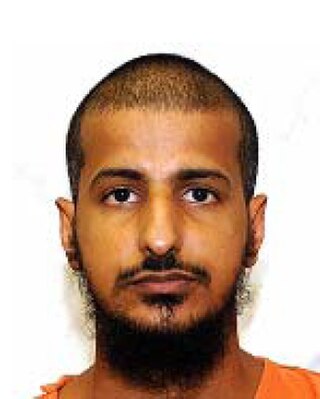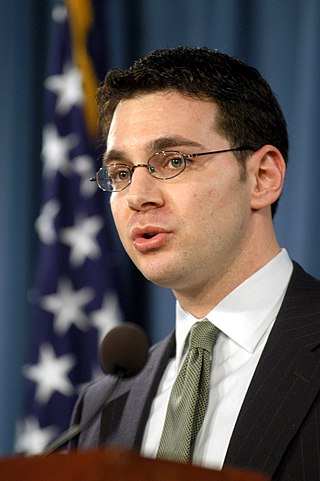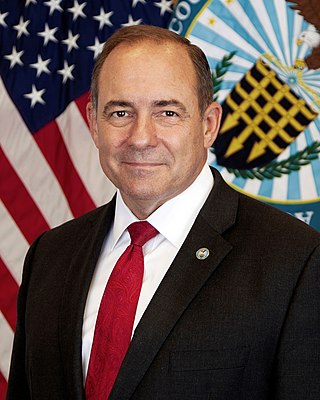Related Research Articles

Yaser Esam Hamdi is a former American citizen who was captured in Afghanistan in 2001. The United States government claims that he was fighting with the Taliban against U.S. and Afghan Northern Alliance forces. He was declared an "illegal enemy combatant" by the Bush administration and detained for almost three years without charge. On October 9, 2004, on the condition that he renounce his U.S. citizenship and commit to travel prohibitions and other conditions, the government released him and deported him to Saudi Arabia, where he had been raised.
The Office for the Administrative Review of the Detention of Enemy Combatants, established in 2004 by the Bush administration's Deputy Secretary of Defense Paul Wolfowitz, is a United States military body responsible for organising Combatant Status Review Tribunals (CSRT) for captives held in extrajudicial detention at the Guantanamo Bay detention camps in Cuba and annual Administrative Review Boards to review the threat level posed by deemed enemy combatants in order to make recommendations as to whether the U.S. needs to continue to hold them captive.
Peter E. Brownback III is a retired military officer and lawyer. He was appointed in 2004 by general John D. Altenburg as a Presiding Officer on the Guantanamo military commissions. The Washington Post reported: "...that Brownback and Altenburg have known each other since 1977, that Brownback's wife worked for Altenburg, and that Altenburg hosted Brownback's retirement party in 1999."

Abdul Zahir is a citizen of Afghanistan currently held in extrajudicial detention in the United States' Guantanamo Bay detention camps, in Cuba. He was the tenth captive, and the first Afghan, to face charges before the first Presidentially authorized Guantanamo military commissions. After the Supreme Court ruled that the President lacked the constitutional authority to set up military commissions, the United States Congress passed the Military Commissions Act of 2006. He was not charged under that system.

Faiz Mohammed Ahmed Al Kandari is a Kuwaiti citizen who was held in extrajudicial detention in the United States' Guantanamo Bay detainment camp in Cuba, from 2002 to 2016. He has never been charged with war crimes.
Jawad Jabber Sadkhan is a citizen of Iraq who was held in extrajudicial detention in the United States Guantanamo Bay detainment camps, in Cuba. Sadkhan's Guantanamo Internment Serial Number was 433.
Abib Sarajuddin is a citizen of Afghanistan, who was held in extrajudicial detention in the United States Guantanamo Bay detention camps, in Cuba. His Guantanamo Internment Serial Number was 458. Guantanamo intelligence analysts estimate that he was born in 1942.

Tariq Mahmud Ahmad Muhammad al-Sawah is a citizen of Egypt who was held in the United States Guantanamo Bay detention camps, in Cuba, from May 2002 to January 2016.
The United States Department of Defense (DOD) had stopped reporting Guantanamo suicide attempts in 2002. In mid-2002 the DoD changed the way they classified suicide attempts, and enumerated them under other acts of "self-injurious behavior".

Ibrahim Othman Ibrahim Idris was a citizen of Sudan, formerly held in extrajudicial detention in the United States' Guantanamo Bay detainment camps, in Cuba. His detainee ID number was 036.

Tarek Ali Abdullah Ahmed Baada is a citizen of Yemen, who was formerly held in extrajudicial detention in the United States Guantanamo Bay detainment camps, in Cuba. His detainee ID number is 178. Joint Task Force Guantanamo counter-terrorism analysts estimated that Baada was born in 1978 in Shebwa, Yemen.
Allah Muhammed Saleem(also transliterated as Alaadinn Muhammad Salim) is a citizen of Egypt who was held in extrajudicial detention in the United States Guantanamo Bay detention camps, in Cuba. His Guantanamo Internment Serial Number was 716. Joint Task Force Guantanamo counter-terrorism analysts report that he was born on January 13, 1967, in Al-Bajoor, Egypt.

David H. Remes is an American lawyer.

Phillip Eugene Carter is an American lawyer, writer, and former officer in the United States Army. Carter was a founding member of Iraq and Afghanistan Veterans of America, and he also served as a principal of the Truman National Security Project. He was senior fellow and counsel at the Center for a New American Security, and director of the CNAS research program on the Military, Veterans & Society. Beginning September 2018, he served as the Director of the Personnel & Resources Program at the Homeland Security Operational Analysis Center in Washington, D.C. Carter now works as senior director, corporate counsel for Salesforce, supporting the company’s public sector businesses, and teaches as an adjunct professor of law at Georgetown University Law Center.

Muhammed Murdi Issa Al Zahrani is a citizen of Saudi Arabia who was held in the United States's Guantanamo Bay detention camps, in Cuba from August 5, 2002, until November 22, 2014. His Guantanamo Internment Serial Number was 713. Joint Task Force Guantanamo counter-terrorism analysts estimate he was born in 1969, in Taif, Saudi Arabia.

Matthew Curtis Waxman is an American law professor at Columbia University and author who held several positions during the George W. Bush administration. He is also currently a Fellow at the Hoover Institution on War, Revolution and Peace.
Karl R. Thompson is an American lawyer and was the Principal Deputy Assistant Attorney General for the Office of Legal Counsel of the United States Department of Justice from 2014 until 20 January 2017; he served as the Acting Assistant Attorney General during that period.

William K. Lietzau is an American lawyer, former U.S. Marine Corps Judge Advocate, and former Director of the Defense Counterintelligence and Security Agency.

Paul Lewis is an American lawyer and diplomat. Lewis served as Marine JAG officer and chief counsel to House Armed Services Committee, before President Obama appointed him as Special Envoy for Guantanamo Bay facility closure.
References
- ↑ Eric Schmitt (2005-12-11). "Pentagon Expert on Detainees Plans to Leave for State Dept". The New York Times. Retrieved 2009-05-06.
- ↑ "Matthew Waxman". Columbia Law School. Archived from the original on 2008-10-01.
- ↑ "Matthew Waxman: member of the Task Force on National Security and Law". Hoover Institute. Archived from the original on 2009-05-20.
- ↑ Al Kamen (2009-02-19). "Until We Have a Playoff System, Bush Is Stuck at No. 36". The Washington Post . Archived from the original on 2011-02-04.
- ↑ "Names: Pentagon". Foreign Policy . 2009-02-18. Archived from the original on 2009-04-25.
- ↑ Spencer Ackerman (February 18, 2009). More Counterinsurgents Join the Obama Pentagon. Archived from the original on July 9, 2009. Retrieved 2009-03-10.
{{cite book}}:|work=ignored (help) - ↑ OARDEC (August 8, 2007). "Index for CSRT Records Publicly Files in Guantanamo Detainee Cases" (PDF). United States Department of Defense . Retrieved 2007-09-29.
- ↑ "William K. Lietzau: Deputy Assistant Secretary of Defense (Rule of Law and Detainee Policy)". United States Department of Defense. Archived from the original on 2011-10-19. Retrieved 2011-11-03.
- ↑ Peter Finn (2011-11-01). "Guantanamo authorities reading attorney-client mail, lawyers say". The Washington Post. Archived from the original on 2011-11-03. Retrieved 2011-11-03.
In a letter Tuesday, nine of the attorneys wrote to William K. Lietzau, deputy assistant secretary of defense for rule of law and detainee policy, to object to authorities reading their mail to clients at the detention center.